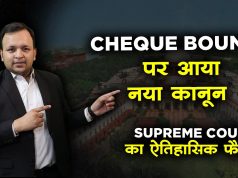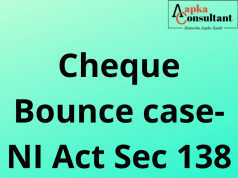Cheques are a very common way of facilitating money transactions and making payments. Since banks have come into existence, most people do not carry cash as a way of exchanging money, especially large sums. Hence, cheques help bring about the convenience in transaction that hard cash lacks.
A cheque itself is not money; rather it is an instrument through which we agree to pay someone a particular amount, and then instruct the bank to pay that amount out of our account. The funds come from the account of the person who is writing the cheque. Just as we cannot pay cash that we don’t have, we also cannot write a cheque for an amount that is not available in our bank account.
Cheques undergo a process once they are submitted in a bank. If we deposit a cheque in our account, then the cheque is sent to the bank of the issuer to ensure that there is sufficient money in the account. If the bank account does not have sufficient money to pay the amount on the cheque, then the cheque will bounce. The official term used by the banks for bouncing of a cheques is dishonor of a cheque. There are many other reasons why a cheque may be dishonored. While the lack of money in the bank account is termed as dishonor due to insufficient funds, there may also be a technical issue with the cheque itself. For example, a problem with the signature on the cheque or overwriting on the cheque or maybe an issue with the date, may also be a reason for the cheque to be dishonored or bounced.
There are many consequences to the dishonor of a cheque. Immediately after a cheque is dishonored, a notice has to be sent to the cheque-writer informing him that the cheque has bounced. If the payment is not made within fifteen days after receiving this notice, then criminal action can be taken. This can include a fine, or even up to two years of imprisonment.
Other than the criminal proceedings, banks themselves also levy charges when cheques are dishonored. This is because the banks must conduct elaborate processes when the cheque bounces and hence the charges for the same are taken from both parties- the payee, who is the receiver of the cheque and the issuer who issued the cheque. The payee and the issuer are liable to pay charges whenever a cheque is returned.
Since these charges are levied for services rendered by the bank, they are not standard amounts and may differ depending upon the bank in which the cheque bounced. Some banks may have higher charges for dishonored cheques than others. Similarly, the same bank may charge different amounts based on the type of account the payee or issuer is holding with the bank. However, the charges can only be levied in cases where the customer is at fault for the cheque bouncing and not for errors made by the bank itself.
The amount of charges can be found on the particular bank’s website, under the list of Bank charges. Here the rates are clearly given depending on the circumstances. If a customer issued a bounced cheque, then they will have to pay Rs. 350, and if more than one cheque bounces in the same month then the charge increases to Rs. 750. These are relatively high rates for a private sector bank and government banks may have lower rates which can be found on their websites respectively.
Hence, all banks charge an amount for bounced cheques. This amount is not only if you issue a cheque which bounces but also if you deposit a bounced cheque. The charges may differ based on the reason for which the cheque bounced. For example, in ICICI Bank, if the cheque is dishonored for insufficient funds or financial reasons, then the above rates will apply. However, if the issue is technical such as a postdated cheque, then the charge is only Rs. 50. Based on this, the bank will require you to pay the respective charges. It is important to check the website of your bank and be aware of the various service charges which can be applicable on your transactions.
Author: This blog is written by Ms. Sweta Pochiraju, a passionate blogger & intern at Aapka Consultant.
OUR SERVICES
Company Registration I Trademark I Copyright I Patent I GST I MSME
ISO Certification I Website/App Policy I Legal Documentation
Annual Compliance I Connect Consultant
Visit: Aapka Consultant to get Online Services of CA CS & Lawyers.












